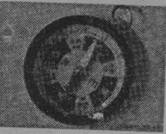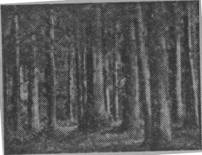网址:http://m.1010jiajiao.com/timu3_id_2410349[举报]
| |||||||||||||||||||||||||||||||||||||||||||||||||||||||||||||||

 Even experienced campers sometimes may get lost.To avoid getting lost stay on Marked trails.Take a notebook and pencil with you for notes.Use a compass so you know what direction you are going.To find your way with a compass,you must know which way you want to go.Before you leave your camp,find a large landmark nearby to mark your campsite(露营地)head in the opposite direction from the landmark,if your compass shows you are going west,which direction will you travel to return to you campsite? East.
Even experienced campers sometimes may get lost.To avoid getting lost stay on Marked trails.Take a notebook and pencil with you for notes.Use a compass so you know what direction you are going.To find your way with a compass,you must know which way you want to go.Before you leave your camp,find a large landmark nearby to mark your campsite(露营地)head in the opposite direction from the landmark,if your compass shows you are going west,which direction will you travel to return to you campsite? East.
If you do get lost,don’t panic.This is the worst thing you can do.People who panic have been known to walk in big circles.They don’t realize this,of course.They exhaust themselves and never get back on course.
If it is late,and others know you are out hiking,stay where you are.Someone will come looking for you soon.
If it is early,and you want to try to find your way back,leave trail marks to show you where you have been.Tie a handkerchief to a branch.Put a pile of stone on the trail you have taken.If you have pen and notebook in your pack,write a note and put it on a tree.Write down the time,date,the fact that you are lost and the direction you are now hiking.
If you are lost at night,build two campfires close together.Two columns of smoke side by side are a signal for help.Rangers and campers will recognize and respond to the fires.They will locate your smoke signals and come to find you.
根据短文内容,判断正误。正确的用“A”表示,错误的用“B”表示。
1.You’d better take a notebook,a pencil and a compass before you go for a camp.
2.Before you leave your camp,find a large landmark nearby to mark your campsite.
3.If you do get lost,you shouldn’t panic before you go back to your campsite.
4.If you are lost at night,build four campfires close together.
5.If you do get lost,you’d better walk back to your campsite quickly.
查看习题详情和答案>>While reading a book in English, every few lines of text, you run across a word or two that you don't know. You look every new word in the dictionary. Bad move. All that does slow you down. Even electric or CD-ROM dictionaries can get in the way of your reading progress. A dictionary is like a road map. It can help you if younger lost and point you in the right direction. But if you stop to look at the "map" each time you take a step, you'll get nowhere fast .
On your English learning "journey (旅行)”, a dictionary Can be a helpful “travel companion"---if it is not overused. To help you start thinking in English, use an English-to-English dictionary. Otherwise(否则),you will always depend on your native(本国的)language and end up translating in you head.
A good dictionary can help you do more than just find the meaning of a word. it can help you verify (test and check) spelling, check word forms and grammar usage, find example sentences and learn pronunciation. Some dictionaries even provide exercises to teach you how to use their resources(资源).
Take time to get to know your dictionary. Learn the pronunciation symbols (符号).
Understand what the abbreviations (缩写字) mean. Try to master the important grammar rules. Look for charts, diagrams and lists that might be useful in the future. You will discover how helpful it can be to make friends with your dictionary. And as they say, "A friend in need is a friend indeed."
1.According to the passage,________________________
A.we should look up each new word we meet while reading
B.dictionaries will be helpful if we use them properly
C.we can't look up any new words we come across while reading
D.we can get everything we want in dictionaries
2.The underlined word "companion" means____________________
A.指南 B.札记 C.工具 D.路标
3.Why do we need a good English-to-English dictionary?
A.Because it is a good friend.
B.Because it can help us to find the right direction if we get lost.
C.Because it can help avoid to think in our native language.
D.Because it can help us to start thinking in English and in Chinese.
4.The underlined word "that" in the last paragraph refers to (指) ____________
A.pronunciation symbols and grammar rules
B.abbreviations and usage for grammar rules
C.the meaning of a word, spelling and grammar usage
D.charts, diagrams and lists
5.According to the passage, we learn that____________________
A.the more you use a dictionary, the better you can understand the article
B.the more you use a dictionary, the faster you may read
C.the more you use the resources in a dictionary, the more information you can get
D.the better a dictionary is, the more expensive it is
查看习题详情和答案>>following information, your life will be much safer.
Always notice the environment (环境) around you. You shouldn't walk alone (独自) outside. Make sure
where the public phones are. If anything dangerous happens, you can find them quickly.
Don't use earphones (耳机) when running in the schoolyard or on the street. You will keep yourself from
the outside world and can be easily surprised.
School bags should be carried (携带) towards the front of your body instead of (而不是) putting them
on your back. When buses are crowded, it is easy enough for thieves to steal the things in your bags on your
back.
If you are followed by a stranger, cross the street and go in the other direction (方向), let the stranger
know that you know he or she is there. Next, go and get help from others if it is necessary. Don't go home
directly. You are safer in the street than you are in your home or in a lift.
If you have to take a bus to a place far away, try to get to the stop a few minutes before the buses leave.
This prevents (阻止) a stranger from studying you. On buses, don't sit alone (独自), sit behind the driver or
with friends. Don't sleep.
Don't play with matches (火柴) or candles (蜡烛), because it may cause fire. If your house catches fire
and you have to escape (逃跑) through smoke, move on your hands and knees with your head 30 to 60
centimetres (厘米) above the floor. Please remember there is cleaner, cooler air near the floor during the
fire.
B. sit in front of the car
C. sleep
D. sit after the driver
B. good
C. important
D. necessary
B. remember the things round you
C. phone your friend
D. get help from others
B. beside you
C. on your back
D. behind the conductor (司机)
B. find a lift and go in
C. turn back and walk towards him or her directly
D. let him or her know that you know he or she is there
and write. Lenin and his wife Krupskaya translated a long English book into Russian. But when they went
to England in 1902, English people couldn't understand a word they said and they couldn't understand what
was said to them. These days more and more foreigners are coming to China and more Chinese are going
out to foreign countries to work or study. So the spoken language is becoming more and more important.
Speaking, of course, can't go without listening. If you want to pronounce a word correctly, first you
must hear it correctly. Thy sounds of the Chinese and English languages are not exactly the same. If you
don't listen carefully, you'll find it difficult or even impossible to understand the native speakers.
Well, what about writing? Like speaking, it's to exchange ideas. People generally use shorter words and
shorter sentences in their writing. The important thing is to make your idea clear in your head and then to
write it in clear lively language.
Chinese students read far too slowly. If you read fast, you understand better. If you read too slowly,
by the time you have reached the end of a page you have forgotten what the beginning is about. When you
meet with new words, don't look them up in the dictionary. Guess the meaning from the context. You may
not guess quite correctly the first time, but as new words come up again and again in different contexts,
their meaning will become clearer and clearer. If you look up every word, you'll never finish a book.
Students of a foreign language need a particular knowledge, the knowledge of the life, history and
geography of the people whose language they are studying. They should study these subjects in the foreign
language, not only in translation. In this way one can kill two birds with one stone: learn a foreign language
and get some knowledge of the foreign country at the same time.
B. how to read and write
C. why spoken English is important
D. why English people couldn't understand Lenin
B. to learn two languages at a time
C. to study all the subjects in a foreign language
D. to get some knowledge of the foreign country whose language you are studying
B. how to guess the meaning from the context
C. how to look up new words in the dictionary
D. how to grasp the general meaning of a passage
B. to get more than what one pays
C. the stone is too big
D. the birds are blind enough